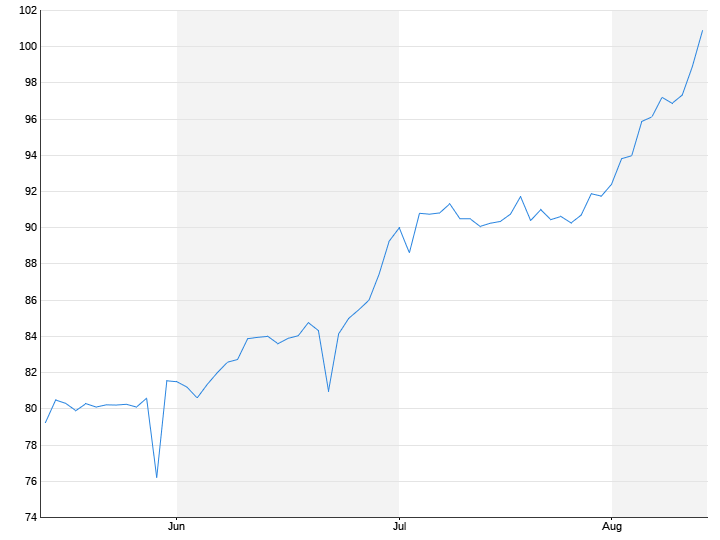Amid ruble plummeting
The Russian central bank is flirting with a rate hike
08/14/2023 1:42 p.m
Despite the countermeasures taken, the ruble is currently as weak as it was at the end of March 2022. During its descent, the Russian currency recently broke through a new mark. The central bank is on alert – and could soon be raising interest rates again.
Against the background of the ruble’s slide and the rising risk of inflation, there are growing indications of an interest rate hike in Russia. The Interfax news agency reported, citing the central bank, that an increase at the next regular meeting in September was possible. In addition, the central bank sees no danger to financial stability in Russia from the decline in the ruble.
The national currency fell 1.4 percent to 101.16 against the dollar at the start of the week, the weakest since March 2022. At that time, after Russia’s attack on Ukraine, the currency jumped for a few weeks because of the rise in energy prices. The ruble has already lost around 30 percent of its external value against the dollar this year.
Maxim Oreshkin, the economic advisor to President Vladimir Putin, stressed in a comment that the Kremlin wants to see a strong ruble and expects a normalization soon. This is seen as a possible sign that the central bank should take action ahead of its next scheduled interest rate meeting in mid-September. “The main reason for the weakening of the ruble and the acceleration of inflation is loose monetary policy,” Oreshkin wrote.
Central bank deputy governor Alexei Sabotkin said the probability of a rate hike in September was high. The monetary watchdogs in Moscow had raised the key interest rate in July for the first time since the beginning of the invasion of Ukraine – and surprisingly sharply by a full point to 8.5 percent. At 4.3 percent in July, the inflation rate exceeded the 4.0 percent target set by the central bank. The central bank expects it to end up at 5.0 to 6.5 percent this year and not return to the stability goal until 2024.
“Central Bank does not have full control”
The weakness of the ruble goes hand in hand with the increasing risk of inflation, against which the central bank is fighting by selling foreign currency holdings. With a flexible interest rate reaction, the monetary authorities have made a significant contribution to buffering the economic effects of the Ukraine conflict and the Western sanctions against Russia.
“The central bank does not have full control,” said Moscow economist Ian Melkumov. Although she has powerful instruments at her disposal, she is reluctant to use them at the moment. The central bank could raise interest rates drastically, as it did after the start of the invasion of Ukraine, which the Kremlin described as a ‘special military operation’. According to the expert, even an increase to 15 percent would stop the ruble from falling. But the central bank does not want to stall the economy with such a big step.
